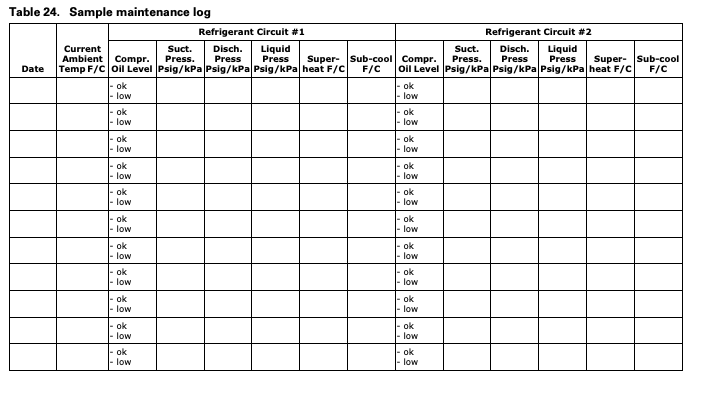Voyager™ Rooftop Units: Annual Maintenance
This annual procedure is for regular coil maintenance, including annual cleaning which enhances the unit’s operating efficiency by minimizing: compressor head pressure and amperage draw; evaporator water carryover; fan brake horsepower, due to increase static pressure losses; airflow reduction.
Voyager™ Rooftop Units: Annual Maintenance
This annual procedure is for regular coil maintenance, including annual cleaning which enhances the unit’s operating efficiency by minimizing: compressor head pressure and amperage draw; evaporator water carryover; fan brake horsepower, due to increase static pressure losses; airflow reduction.
Condenser Coil Cleaning
Regular coil maintenance, including annual cleaning, enhances the unit’s operating efficiency by minimizing: compressor head pressure and amperage draw; evaporator water carryover; fan brake horsepower, due to increase static pressure losses; airflow reduction.
At least once each year, or more often if the unit is located in a “dirty” environment, clean the condenser coils using the instructions outlined below. Be sure to follow these instructions as closely as possible to avoid damaging the coils.
Microchannel (MCHE) Coils
NOTICE:
Coil Damage!
DO NOT use any detergents with microchannel coils. Use pressurized water or air ONLY, with pressure no greater th
Due to the soft material and thin walls of the MCHE coils, the traditional field maintenance method recommended for Round Tube Plate Fin (RTPF) coils does not apply to microchannel coils.
Moreover, chemical cleaners are a risk factor to MCHE due to the material of the coil. The manufacturer does not recommend the use of chemical cleaners to clean microchannel coils. Using chemical cleaners could lead to warranty claims being further evaluated for validity and failure analysis.
The recommended cleaning method for microchannel coils is pressurized water or air with a non-pinpoint nozzle and an ECU of at least 180 with pressure no greater than 600 psi. To minimize the risk of coil damage, approach the cleaning of the coil with the pressure washer aimed perpendicular to the face of the coil during cleaning. Optimum clearance between the sprayer nozzle and the microchannel coil is 1”–3”.
Final Process:
For future reference, you may find it helpful to record the unit data requested below in the blanks provided.
Source: Trane (www.trane.com)

